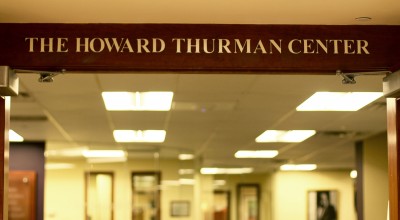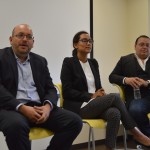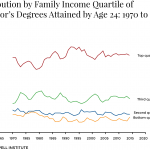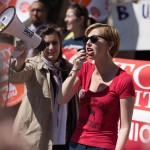
Approximately 60 members of the Boston University community gathered in the Howard Thurman Center for Common Ground Tuesday evening and exchanged ideas for a social hub on campus that would make cultural celebration and inclusion a mainstream part of campus life.
School of Theology Dean Mary Elizabeth Moore said members of the BU community are the most important part in planning for the center’s expansion.
“The expansion is meant to make the HTC and its work more visible,” Moore said after the session. “Any expansion of the Howard Thurman Center needs to be informed by the students, faculty and staff at the university so that they can respond to the real needs at Boston University.
The gathering was geared toward supporting short- and long-term goals by having students and faculty generate ideas.
“Eventually, this event will benefit future students, faculty and staff at Boston University,” Moore said. “Immediately, this event will guide people’s vision in proposals, so what we propose to the president and board of trustees is representative of what people at BU think we need.”
Dean of Students Kenneth Elmore and Moore wrote in an email sent Jan. 26 to the BU community that they encouraged students and faculty to attend the “listening session,” participate and provide input on how to support the growth of HTC into a center for diversity.
“Our particular charge is to determine how we can build on and strengthen the capacities of the Howard Thurman Center for Common Ground so that it can serve our community more broadly and visibly,” they wrote, “as we seek to promote understanding and develop leaders for a pluralistic and ever-changing world.”
BU President Robert Brown announced in a campus-wide email sent Dec. 2, 2015 the creation of a committee of students, staff and faculty to propose an expanded and more visible HTC. The Tuesday session marked the first conversation between the committee and the BU community. A second session is scheduled for Feb. 17.
Moore said differences among cultures should foster acceptance and overcome tensions that exist among varied groups of people.
“We have a legacy of all cultures and communities we represent,” Moore said as she ended the session. “We also have a very ugly legacy of living in a world that is filled with hate, discrimination and bias. We want those legacies not to limit us, but to open the possibilities and opportunity.”
Several student attendees said the HTC provides platforms for students to contribute their ideas for the future of the HTC and meet peers who support cultural discussion and celebration.
Joseph Yeb, a freshman in the College of General Studies, said meetings based on cultural discussion create a sense of community among students with similar cultural traits.
“I am Latino student and I go to group meetings,” he said. “Students come together looking for community. I was hoping to do more networking and meeting people like me and spend time with friends I have here.
Justin Montes, also a freshman in CGS, said the HTC makes a number of forums available for him to connect with other students of the same cultural and ethnic background.
“This meeting gives me the chance to meet other Hispanic students because I don’t know a lot here,” he said. “I found a comforting place where I can go and hear what other people say.”
Neckea Cantave a sophomore in the Questrom School of Business, said she is most concerned with the future of the HTC and hopes to see follow-up conversations to continue to flourish in the BU community.
“I was hoping to get my opinions out there and see what other people were hoping to see from the future of HTC and to be involved in the discussion,” she said. “This meeting has sparked conversation, and I hope that this meeting continues to be a dialogue.”
Miriam Lelah contributed to the reporting of this article.




